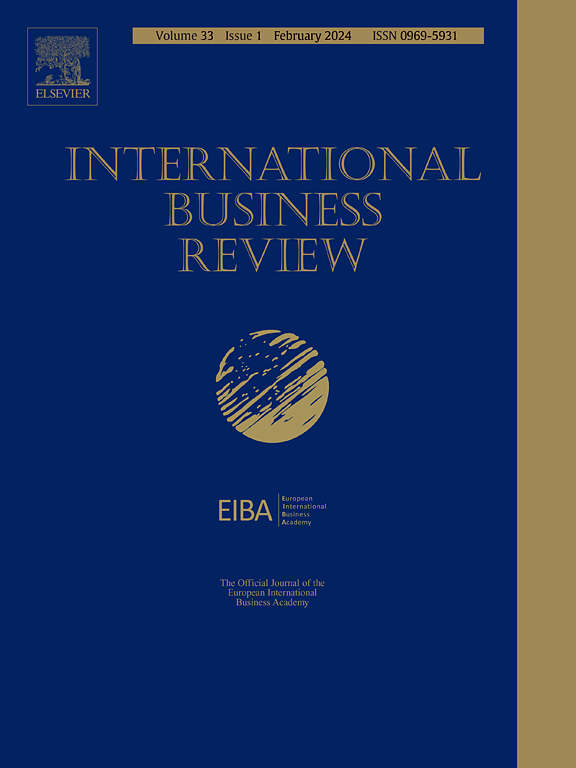虚拟和关系关系如何影响新兴市场诞生的全球企业的国际机会实现?权变模型
IF 6.1
1区 管理学
Q1 BUSINESS
引用次数: 0
摘要
企业家如何利用虚拟关系来识别和利用国际机会?虽然人们普遍认识到,在虚拟互联的时代,企业在互联网上建立的关系中茁壮成长,但互联网的作用和意义仍有待充分理解。基于企业家精神、社会网络和信息处理理论,本文提出了国际机会实现的虚拟关系关系偶然性模型。对273家“中国出生的全球企业”的调查结果表明,虚拟关系和关系关系对国际市场机会实现都有正向影响,且差异不显著。此外,虚拟和关系关系的价值依赖于任务和环境的不确定性。在国外市场多样化、国内制度不确定的情况下,虚拟联系更有价值。当产品复杂时,关系关系在追求国际机会时更为有效。然而,当技术变化迅速,国外市场多样化,国内制度不确定时,关系关系的效果较差。本文章由计算机程序翻译,如有差异,请以英文原文为准。
How do virtual and relational ties affect international opportunity realization for emerging market born-global firms? A contingency model
How do entrepreneurs use virtual relationships to identify and capitalize on international opportunities? While it is widely recognized that, in the age of virtual interconnectedness, businesses thrive on relationships that they establish over the Internet, its role and significance remain to be fully understood. Drawing on entrepreneurship, social networks, and information processing theory, we propose a contingent model of virtual and relational ties on international opportunity realization. Empirical findings from a survey of 273 Chinese Born Global firms indicate that both virtual and relational ties have positive effects on international market opportunity realization and the effect is not significantly different. In addition, the value of virtual and relational ties is dependent on task and environmental uncertainty. Virtual ties are more valuable when foreign markets are diverse and domestic institutions are uncertain. Relational ties are more effective in the pursuit of international opportunity when products are complex. However, relational ties are less effective when: technology is changing rapidly, foreign markets are diverse, and domestic institutions are uncertain.
求助全文
通过发布文献求助,成功后即可免费获取论文全文。
去求助
来源期刊

International Business Review
BUSINESS-
CiteScore
14.10
自引率
6.90%
发文量
95
审稿时长
62 days
期刊介绍:
The International Business Review (IBR) stands as a premier international journal within the realm of international business and proudly serves as the official publication of the European International Business Academy (EIBA). This esteemed journal publishes original and insightful papers addressing the theory and practice of international business, encompassing a broad spectrum of topics such as firms' internationalization strategies, cross-border management of operations, and comparative studies of business environments across different countries. In essence, IBR is dedicated to disseminating research that informs the international operations of firms, whether they are SMEs or large MNEs, and guides the actions of policymakers in both home and host countries. The journal warmly welcomes conceptual papers, empirical studies, and review articles, fostering contributions from various disciplines including strategy, finance, management, marketing, economics, HRM, and organizational studies. IBR embraces methodological diversity, with equal openness to papers utilizing quantitative, qualitative, or mixed-method approaches.
 求助内容:
求助内容: 应助结果提醒方式:
应助结果提醒方式:


